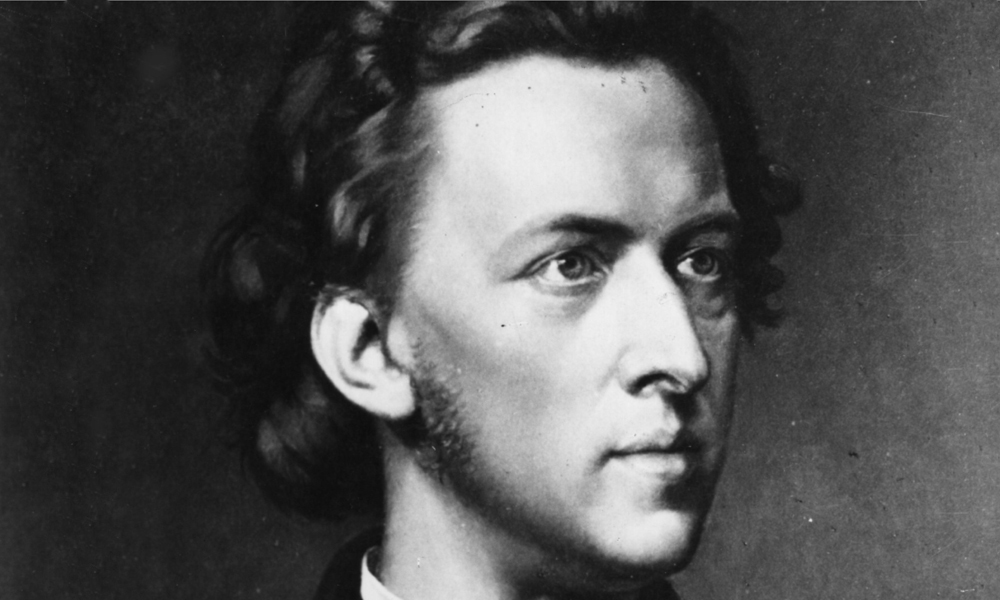The Polish composer may be the latest in a line of historical figures whose evidence of queer experiences has been lost to history…
By Steven Greenwood
Rob Picheta, writing for CNN, recently discussed debates surrounding composer Frédéric Chopin’s sexuality, highlighting their relevance to larger issues of oppression and homophobia in Poland. Picheta referenced studies by journalist Moritz Weber, who claims that biographies and other accounts of Chopin’s life intentionally distort and change facts about history – allegedly changing the genders of the subjects of his writings and forging fake letters between him and women – in an attempt to hide his relationships with men.
This all may seem quite shocking: allegations that people would forge, alter or otherwise distort historical documents to hide someone’s sexuality seem like a conspiracy theory or something out of a Dan Brown novel. However, for anyone familiar with the study of queer history, this sort of situation is much more common than one may think. In 1996, scholar José Esteban Muñoz outlined the many ways in which oppression leads to the suppression, distortion and destruction of evidence about the existence of queer communities throughout history. Chopin may be the latest in a line of historical figures whose evidence of queer experiences has been lost to history – or even intentionally destroyed – as a result of a heteronormative and oppressive society.
On the one hand, part of the issue of missing or distorted evidence comes from the fact that queer communities have had to hide proof of our ownexperiences, living our lives in secret to avoid persecution. Muñoz states: “Queerness is often transmitted covertly. This has everything to do with the fact that leaving too much of a trace has often meant that the queer subject has left herself open for attack.” When being open about who you are means being vulnerable to violence and discrimination – both state-sanctioned and otherwise – it makes sense that queer communities have intentionally avoided leaving too much of a visible trace of their experiences with gender and sexuality, as this evidence would directly threaten their safety.
However, even when queer communities do choose to publicly declare their experiences, forces are always actively working to silence these declarations. Sometimes, this happens in obvious and explicitly violent ways. In 1933, the Institut für Sexualwissenschaft (or the Institute for Sexology), which contained extremely valuable research on gender and sexuality (including that of sex and gender studies pioneer Magnus Hirschfeld), was destroyed, along with its resources and research, by Nazis. The Institut provided gender-affirming surgeries, and contained a wealth of information on the historical experiences of trans people, all of which was destroyed by an oppressive regime.
In other ways, the violent destruction and distortion of queer historical evidence is not as obvious or explicit as book burning and the destruction of institutes. It can come in the form of family members or descendants of queer people going out of their way to disguise the truth in a misguided attempt to “protect” their family’s legacy. Cheryl Dunye famously drew attention to this sort of practice in her film The Watermelon Woman, the story of a woman trying to find evidence that an actress she admires from older films was a lesbian. In one scene, the protagonist meets with the sister of one of the actress’s lovers, only to find that the sister aggressively fights to actively suppress and deny her sister’s relationships with women.
This violence against the preservation of queer history is also not limited to the distant past, but is still actively happening. Transgender people are still misgendered and misnamed in obituaries and at their funerals, as families begin to erase their identities and experiences immediately after their deaths. If people are willing to publish false information about family members in obituaries and official funeral documents now, erasing their gender identities from the historical record even in the so-called “information age,” it’s really not that surprising that they were willing to similarly falsify and alter documents throughout the rest of history.
This, of course, raises the question: how do queer communities find ourselves in history if oppressive forces are constantly at work to erase evidence of our existence? Part of Muñoz’s argument is that we should invest more in what he refers to as “ephemeral evidence.” This type of evidence consists of things like personal stories, anecdotes, informal documents, fragments, and even things like gossip that aren’t often considered “legitimate” evidence. An ephemeral approach to evidence looks for innuendo, hints, clues, implications, subtext, and coded and subtle expressions of queer identity, desire and life, and takes these things seriously as evidence of historical queerness.
For anyone who is used to a telling of history that requires more conventionally accepted types of formal evidence, this may be a hard approach to swallow. However, when heteronormative society has gone out of its way to destroy and distort official evidence of queerness, there is often no other choice; it seems unreasonable to destroy queer evidence and then criticize queer historians for not having that evidence. It’s the equivalent of stealing someone’s shirt, and then criticizing them for not having a shirt.
In this situation, taking innuendo and coded subtext seriously as a sign of queer life that has been otherwise silenced can be a powerful and meaningful choice. Furthermore, acknowledging the ways that more official documents and forms of evidence are often distorted, intentionally framed for conservative purposes, and even falsified, can bring an important level of criticism and skepticism surrounding accounts that claim to be objective. Appeals to statistics and science have historically been used to further oppressive political agendas, and can be as misleading or inaccurate as personal anecdotes and stories.
This isn’t, of course, to say that all ephemeral evidence should be accepted uncritically, or that all forms of official discourse are inherently suspect and wrong: this sort of thinking leads to dangerous things like climate change denial, anti-vaxxers and Holocaust denial. There are some cases when facts are facts, and more official sources need to be trusted. There is a level of negotiation and complicated work required on both of these fronts that mindfully navigates both official and ephemeral evidence to ensure that they’re being used responsibly and ethically; discerning historians know to take official forms of evidence and ephemeral forms of evidence with appropriate amounts of both skepticism and trust to navigate the murky waters of history.
In addition to investing in ephemeral evidence, queer communities can also engage in archival work to recover and unearth queer history that has been destroyed, and work to preserve our own history now to resist it being destroyed in the future. Projects like the Museum of Transgender History and Art, the Leslie-Lohman Museum of Art and the Transgender Oral History Project are actively doing this work, archiving and preserving both formal and ephemeral evidence to protect it from those cultural forces that would work to destroy it.
We also need to recognize intersectionality and the ways in which some queer communities actually end up destroying each other’s history. Dunye’s film explores a moment where she attempts to navigate a lesbian information centre, only to find that structural racism has led to the neglect of Black lesbian history in the centre’s archives. Queer history is often told through a white, cisgender perspective (including a recent New York Times article on gay theatre history that was prominently criticized for focusing almost exclusively on white, cis men) that erases other queer voices.
Susan Stryker’s book Transgender History highlights how the Queens Liberation Front was established within a year of Stonewall in response to efforts to erase drag queens and trans people from the history of the riots. Trans people of colour continue to be erased from accounts of Stonewall in film and in history books. If we want to protect queer history from the violence of oppressive forces, we also need to recognize the ways in which people with more privilege within queer communities need to stop erasing the history of other queer people.
For anyone interested in the complicated work of learning about a history that has largely been destroyed or suppressed, this was a common issue explored in queer cinema of the 1990s. The Watermelon Woman, as well as John Greyson’s Zero Patience and Todd Haynes’ Velvet Goldmine, all provide a good representation of this complicated journey through a fragmented history. The Transgender Oral History Project and Museum of Transgender History and Art are also both available online, and provide a good starting point for better understanding the work of preserving and uncovering queer histories.
To end with a Sasha Velour quote on the value of ephemeral evidence in all its instability and beauty: “Drag queens have always been the keepers of our queer history. We make it, we tell it, we remember it, we misremember it, and we love it.” As much as heteronormative culture tries to keep our stories hidden, we will always find ways to make sure they resurface.
—
STEVEN GREENWOOD is a PhD candidate at McGill University, where he researches the relationship between queer communities and popular culture. His dissertation explores queer reception of musicals, focusing specifically on how this reception has changed (and hasn’t) since the turn of the 21st century. He also writes and directs for stage and screen, and serves as the artistic director of Home Theatre Productions.







POST A COMMENT